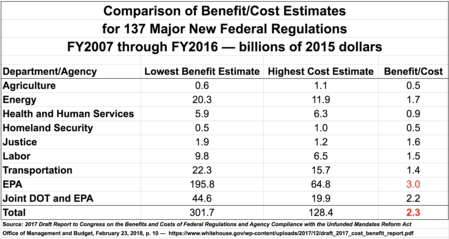Deregulation
Deregulation refers to either removing or limiting government regulations of a market. President Trump and other Republicans believe that some U.S. markets are over-regulated. However, the U.S. ranks high on the world scale of regulatory freedom, ranking 17th (mostly free) out of 169 countries on The Heritage Foundation's 2017 edition of the Index of Economic Freedom[353] and sixth out of 143 countries on the 2016 Cato Institute freedom index,[354] meaning the U.S. markets are relatively unregulated compared to other countries. It is arguable whether additional deregulation would be beneficial.[354] For example, regulations or anti-trust action that address monopoly or oligopoly conditions can improve competition in a market, lowering prices and expanding output and employment.[355]
A report released in February 2018 by the Trump administration Office of Management and Budget (OMB) analyzed 137 "major" federal regulations (those with $100 million or more in economic impact) from FY2007 through FY2016, a period that encompasses all but the last four months of the Obama administration.[356] According to OMB calculations, in constant 2015 dollars the overall economic benefits far outweighed the economic costs, with aggregate benefits ranging from $302 to $930 billion, while aggregate costs ranged from $88 to $128 billion. Overall, the lowest estimate of regulatory benefits exceeded the highest estimate of regulatory costs by a ratio of 2.3X. Among the department/agency regulations that were evaluated, the largest ratio of lowest estimated benefits to highest estimated costs was 3.0X for the EPA, which the Trump administration has targeted for particularly aggressive regulatory rollback under administrator Scott Pruitt. Journalist David Roberts wrote in Vox in March 2018 that: "According to OMB – and to the federal agencies upon whose data OMB mostly relied – the core of the Trumpian case against Obama regulations, arguably the organizing principle of Trump's administration, is false." Rolling back Obama-era regulations can cost money, rather than save it, and there was no discernible job impact.[357]
The QuantGov project[358] at the Mercatus Center tracks the count of federal regulations containing restrictive terms such as "shall," "prohibited" or "may not." Their data indicate that such regulations increased 0.7% in calendar 2017, compared to 1.1% in 2016 and 0.1% in 2015, and compared to an average of 1.4% over the preceding 20 years.[359]
Through September 2018, the Trump administration published 69 new "major" regulatory rules in the Federal Register.[360]
According to the nonpartisan Institute for Policy Integrity, through the middle of the Trump administration's fourth year about 10% of its deregulatory efforts had been upheld by courts, compared to an average of 70% during previous Republican and Democratic administrations.[361]
Fun-Facts hey bacci.....
- Forums
- Political Debate
- US election
DeregulationDeregulation refers to either removing or limiting...
-
- There are more pages in this discussion • 43 more messages in this thread...
You’re viewing a single post only. To view the entire thread just sign in or Join Now (FREE)
Featured News
Featured News
The Watchlist
CCO
THE CALMER CO INTERNATIONAL LIMITED
Anthony Noble, CEO
Anthony Noble
CEO
SPONSORED BY The Market Online





